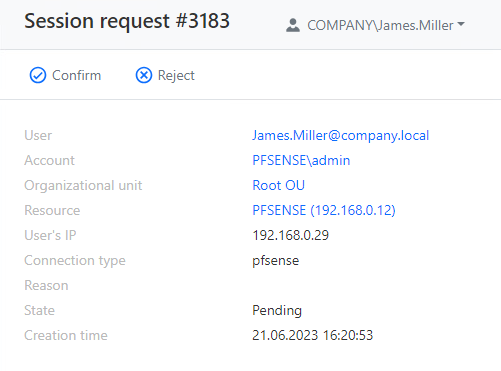The section is designed to work with requests for actions. This mechanism allows you to configure additional confirmation by a second person (PAM Administrator) to connect to the target resource.
Action requests always display the historical values of the User, Resource and Account at the time of the request creation. Historical names in Requests and Sessions may be different because when opening a session, the current value of the User, Resource, Account is saved.
Search action requests
Quick search
Enter the User, Account or Resource in whole or in part in the search bar.
Extended search
Click Extended search and enter one or more criteria, Request number, creation time interval, Account, Resource, Resource group, Organizational unit, User.
Select request state:
- Pending
- Confirmed
- Rejected
- Expired
- Canceled by user
- Used
- Not used
Select the request type:
Action request functions
Action request Confirmation
This feature allows the PAM Administrator to confirm the User's request.
- Click Confirm in the request page, or by selecting the pending request's check box.
Action request rejection
This feature allows the PAM Administrator to reject a User's request.
- Click Reject in the request page, or by selecting the pending requests check box.
Request page

The request page displays the following data:
- User - the user of the Active Directory who created the request to open a session.
- Account - an account that is used to open an RDP, SSH or web session on the resources specified in the permission.
- Resource - resources on which RDP, SSH or a web session can be opened on behalf of the account specified in the permission.
- User's IP - IP address of the user who sent the request
- Connection type
- Reason is arbitrary text entered by the user when creating a request.
- State - the current status of the request (Pending, Confirmed, Rejected, Expired, Canceled by user, Used, Not used).
- Creation time - date and time when the request was created by the user.